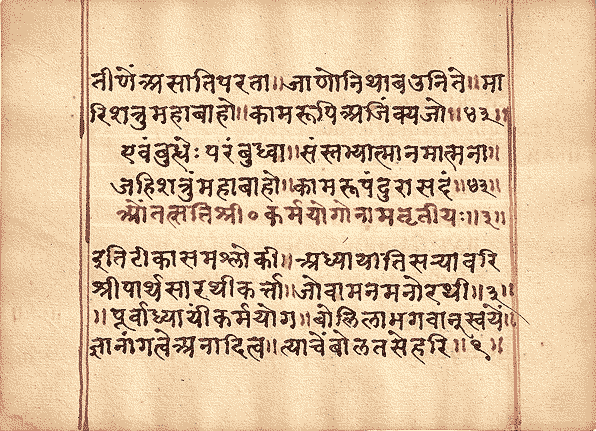BhG 3.43
evaṃ buddheḥ paraṃ buddhvā saṃstabhyātmānam ātmanā
jahi śatruṃ mahā-bāho kāma-rūpaṃ durāsadam
Update Required
To play the media you will need to either update your browser to a recent version or update your Flash plugin.
To play the media you will need to either update your browser to a recent version or update your Flash plugin.
syntax
he mahā-bāho (O mighty-armed one!),
evam (thus) buddheḥ (than intelligence) param (superior) buddhvā (after knowing),
ātmanā (by the self) ātmānam (the self) saṁstabhya (after steadying)
durāsadam (difficult to conquer) kāma-rūpam (in the form of desire) jahi (you must kill).
grammar
| evam | – | av. – thus; |
| buddheḥ | – | buddhi 5n.1 f. – than intelligence, thought, understanding, knowledge, idea, opinion (from: √budh – to wake, to perceive, to understand); |
| param | – | para 2n.1 n. – beyond, ancient, final, the best, the supreme; |
| buddhvā | – | √budh (to wake, to perceive, to understand) absol. – after knowing; |
| saṁstabhya | – | sam-√stambh (to support, to steady) absol. – after steadying, after restraining; |
| ātmānam | – | ātman 2n.1 m. – self; |
| ātmanā | – | ātman 3n.1 m. – by the self; |
| jahi | – | √han (to strike, to beat, to kill) Imperat. P 2v.1 – you must kill; |
| śatrum | – | śatru 2n.1 m. – enemy, rival (from: √śad – to fall, to disperse, to kill); |
| mahā-bāho | – | mahā-bāhu 8n.1 m.; BV: yasya bāhū mahāntau staḥ saḥ – O you who have mighty arms (from: √mah – to magnify, mahant – great; √baṁh – to grow, to increase, bāhu – the arm); |
| kāma-rūpam | – | kāma-rūpa 2n.1 m.; BV: yasya rūpaṁ kāmo ‘sti tam – that whose form is desire (from: √kam –to wish, to love, to long for, kāma – wish, desire; √rūp – to form, rūpa – shape, figure, beauty); |
| durāsadam | – | dur-ā-sada 2n.1 m. – difficul to meet, to conquer (from: dur / dus – prefix: difficult, bad, hard; ā-√sad – to sit near, to approach, ā-sada – meeting); |
textual variants
buddhvā → matvā / buddhaḥ (after thinking / knower);
saṁstabhyātmānam → sastaṁbhyātmānam / saṁstutyātmānam / saṁyamyātmānam (after steadying the self / after praising the self / after restraining the self);
Śāṃkara
The key:
an excerpt from the commented verse
quotes from the scriptures
starting polemic
| tataḥ kiṃ — | ||
|
Thus knowing Him who is superior to reason, subduing the self by the self, |
evaṃ buddheḥ paraṃ buddhvā saṃstabhyātmānam ātmanā | |
|
|
Thus understanding the Self who is superior to reason and subduing the self by the self, i. e., steadily composing the self by means of the self, |
evaṃ buddheḥ param ātmānaṃ buddhvā jñātvā saṃstabhya samyak stambhanaṃ kṛtvātmānaṃ svenaivātmanā saṃskṛtena manasā samyak samādhāyety arthaḥ | | |
|
do thou slay desire. It is difficult to conquer desire, on account of its complex and incomprehensible nature. |
jahy enaṃ śatruṃ he mahābāho! kāma-rūpaṃ durāsadaṃ duḥkhenāsada āsādanaṃ prāptir yasya taṃ durāsadaṃ durvijñeyāneka-viśeṣam iti ||3.43|| |
Rāmānuja
evaṃ buddher api paraṃ kāmaṃ jñānayogavirodhinaṃ vairiṇaṃ buddhvā ātmānaṃ manaḥ ātmanā buddhyā karmayoge ‚vasthāpya enaṃ kāmarūpaṃ durāsadaṃ śatruṃ jahi nāśayeti
Śrīdhara
upasaṃharati evam iti | buddher eva viṣayendriyādi-janyāḥ kāmādi-vikriyāḥ | ātmā tu nirvikāras tat-sākṣīty evaṃ buddheḥ paramātmānaṃ buddhvātmanaivaṃ tṛtayā niściyātmikayā buddhyātmānaṃ manaḥ saṃstabhya niścalaṃ kṛtvā kāma-rūpiṇaṃ śatruṃ jahi māraya | durāsadaṃ duḥkhenāsādanīyaṃ durvijñeyam ity arthaḥ
Madhusūdana
phalitam āha evam iti | raso ‚py asya paraṃ dṛṣṭvā nivartate ity atra yaḥ para-śabdenoktas tam evambhūtaṃ pūrṇam ātmānaṃ buddheḥ paraṃ buddhvā sākṣātkṛtya saṃstabhya sthirītkṛtyātmānaṃ mana ātmanaitādṛśa-niścayātmkiayā buddhyā jahi māraya śatruṃ sarva-puruṣārtha-śātanaṃ he mahābāho mahā-bāhor hi śatru-māraṇaṃ sukaram iti yogyaṃ sambodhanam | kāma-rūpaṃ tṛṣṇā-rūpaṃ durāsadaṃ duḥkhenāsādanīyaṃ durvijñeyāneka-viśeṣam iti yatnādhikyāya viśeṣaṇam
Viśvanātha
upasaṃharati evam iti | buddheḥ paraṃ jīvātmānaṃ buddhvā sarvopādhibhyaḥ pṛthak-bhūtaṃ jñātvā ātmanā svenaivāmānaṃ svaṃ saṃstabhya niścalaṃ kṛtvā durāsadaṃ durjayam api kāmaṃ jahi nāśaya
Baladeva
evam iti | evaṃ mad-upadeśa-vidhayā buddheś ca paraṃ dehādi-nikhila-jaḍa-varga-pravartakatvād viviktaṃ sukha-cid-ghanaṃ jīvātmānaṃ buddhvānubhūyety arthaḥ | ātmanā īdṛśa-niścayātmikayā buddhyātmānaṃ manaḥ saṃstabhya tādṛśy ātmani sthiraṃ kṛtvā kāma-rūpaṃ śatruṃ jahi nāśaya | durāsadaṃ durdharṣam api | mahā-bāho iti prāgvat
Both comments and pings are currently closed.
- Copyright © 2010-2013 Quo Vadis Vision. Wszelkie prawa zastrzeżone.
- |
- About the project
- Appendices
- Audio
- Forum
- Contact

